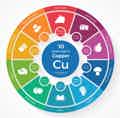Is Copper an Essential Micronutrient?
Copper is an essential part of your mitochondria, the powerhouse of the cell. Copper is a monovalent cation found in foods such as spinach, sesame seeds, chocolate, nuts, parmesan, and mushrooms. The recommended daily value is 1100mcg for women and 1400mcg for men (1).

Table of Contents
Why does the human body need copper?
We know that copper is an essential part of mitochondria, but what else does copper do?
Can you ingest too much or too little copper?
What’s the best way to make sure you’re getting the right amount of copper?
Taking a multivitamin with minerals every other day is a great place to start. Recent studies have shown that supplementing micronutrients such as iron and copper every other day is superior to daily for absorption.
When you supplement every day, your body thinks you are getting too much of these metals regardless of your true body stores and wastes them. You can also eat a varied diet full of nuts, shellfish, and even dark chocolate! In low resource settings, when copper supplementation is needed but conventional preparations are unavailable, cocoa powder is used.
1. Health Effects of Copper Deficiencies, National Research Council (US) Committee on Copper in Drinking Water.
The Vitaliboost Health Guide
